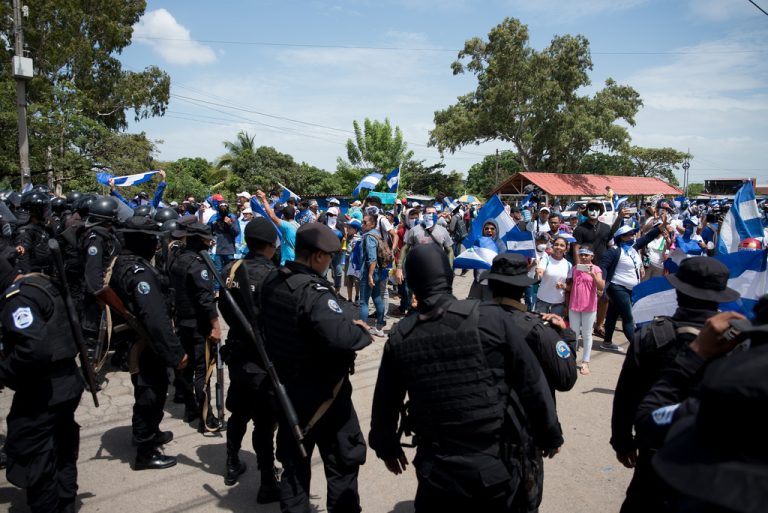11 de febrero 2019

The Return of the Military

PUBLICIDAD 1M
PUBLICIDAD 4D
PUBLICIDAD 5D
“They’ve used the entire State apparatus against the population. Farmers, students, feminists, journalists, people from all over are persecuted"

“The individuals and organizations that call for these illegal displacements will be brought to justice
Among all the violations of human rights committed by the dictatorship of Daniel Ortega and Rosario Murillo since April of 2018, there’s one that they continue to relentlessly practice using the police state they’ve imposed: persecution.
That’s the consensus of a number of experts: former Guatemalan Attorney General Claudia Paz y Paz, a member of the OAS’ Interdisciplinary Group of Independent Experts (GIEI); Ericka Guevara Rosas, Director of the Americas for Amnesty International; and journalist Tiffani Roberts from Univision.
The three professionals attended a panel discussion organized at Florida International University in Miami to analyze “the grave violations of human rights,” under the Ortega-Murillo dictatorship.
The chat was moderated by Luis Guillermo Solis, former president of Costa Rica, whose country has offered asylum to thousands of Nicaraguans fleeing the political violence and persecution from the police and the paramilitary.
“Apart from the extra-judicial executions, crimes of persecution for political motives are being committed,” Guevara Rosas alerted. “People from the general population are being persecuted: farmers, students, feminists, journalists.. They’ve used the entire state apparatus against the population,” the Amnesty International Director for the Americas stated regretfully.
According to data provided by the UN High Commissioner for Refugees, by the end of September, at least 60,000 Nicaraguans had been forced to leave the country. The actual number could now have surpassed 70,000 in the face of the police state that’s been established in Nicaragua. Since the month of December, at least 60 journalists have had to go into exile in order to escape the dictatorship’s systematic harassment.
“Exile is another form of persecution. Activist Ana Quiros had her nationality taken away, and they’re trying to threaten Lucia Pineda with the same thing,” sustained Ericka Guevara.
Former Costa Rican President Solis stated that the socio-political crisis in Nicaragua has an impact beyond its borders. He knows this first-hand, because of the wave of the persecuted that have sought asylum in Costa Rica. The former leader, now a professor at Florida International University, denounced “the grave collusion between the state and the police” in the massive violation of human rights.
Along the same lines, Tiffani Roberts related her experiences covering the crisis. The Nicaraguan reporter was involved in a number of events where the paramilitary forces were at the head of the repression.
“The paramilitary were acting in coordination with the Police. It was clear who was in charge. The paramilitary entered first, and the police acted as a rearguard,” Roberts, a seasoned Univision correspondent, related. “The most alarming aspect of all this complicity is the impunity. Who responds for what the paramilitary do? The Police were then infected by this same impunity,” the journalist pointed out.
Former president Solis said the democratic crisis in Nicaragua didn’t begin on April 18, 2018. “All these things we’re seeing, like the illegitimate use of penal classifications (to criminalize demonstrators), aren’t new. The pact between Daniel Ortega and Arnoldo Aleman, which is the base of understanding of the upper political echelons and part of the church hierarchy at that time, began the process that has led to here,” he assured.
Former Attorney General Claudia Paz y Paz insisted – as did other members of the GIEI – that the crimes against humanity committed by Daniel Ortega’s dictatorship “aren’t subject to amnesty.”
“Such crimes don’t expire. Those who commit them can be pursued at an international level, so that another jurisdiction that recognizes this in its internal law code could process and judge them. Although Nicaragua hasn’t signed the statute of Rome, that doesn’t impede the UN Security Council, for example, from presenting the case and they could ratify the statute,” Paz y Paz explained.
Claudia Paz y Paz presented the final report of the GIEI before the panel opened. She underlined the impunity that reigns in Nicaragua, the inaction of the Attorney General’s office and the serious criminalization of protest.
“There’s a policy of repression that’s been accepted by the authorities in Nicaragua… Those acts, like the killings and the persecution, are considered crimes against humanity,” she declared.
PUBLICIDAD 3M
Periodista. Destaca en cobertura a violaciones de derechos humanos: desplazamiento forzado, tráfico ilegal en territorios indígenas, medio ambiente, conflictos mineros y ejecuciones extrajudiciales. Premio Iberoamericano Rey de España 2018.
PUBLICIDAD 3D